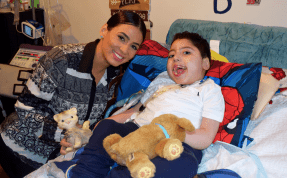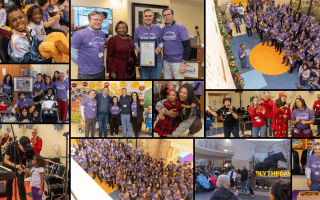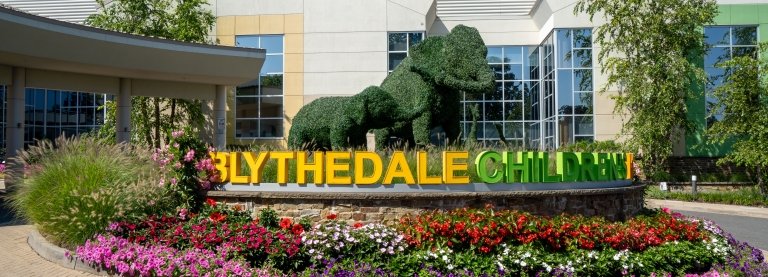Keeping our Families in the Community Safe During the Pandemic

Since its inception in 1891, Blythedale Children’s Hospital has helped countless medically complex children and their families weather myriad global health crises - from tuberculosis and polio outbreaks in its earlier days to today’s Covid-19 pandemic.
For the parents of children with special medical needs, the vast spread of the virus and subsequent mandated closures of programs like Blythedale’s Day Hospital have left families feeling isolated and fearful. Ensuring that families in the community aren’t left without a lifeline, the Hospital’s Health Home program has adapted its outreach and laser-focused its efforts on crisis management to ensure no one slips between the cracks.
“We are in unprecedented and uncertain times,” said Elizabeth Grossfeld, LCSW, one of Blythedale’s Health Home care managers. “For our families with medically fragile children, who depend on the stability of their medical and community support systems, this is terrifying. Throughout all of these changing circumstances, our role and the core concept of Health Home remains the same. We are here to connect our members to the resources and services they need to survive.”

Prior to the pandemic, according to Grossfeld, constancy for patient families enrolled in the Hospital’s Health Home was a struggle. “Now with the added barriers of job loss, closed schools, closed public assistance offices, closed doctors’ offices, overburdened hospitals, and stay-at-home orders, our families have become completely isolated. Our role as Health Home Care Managers is critical; now more than ever, we are their lifelines.”
A “Health Home” is a care-coordination program available to Medicaid recipients with two or more chronic conditions. Patient families are assigned a care manager who helps coordinate and advocate for medical and social services, ensuring that the child receives the care and support needed to stay healthy. Blythedale, identifying the great need for care coordination services for medically fragile children, formally launched its Health Home program four years ago.
“With so much expertise in providing care to this exceedingly vulnerable population, it was a natural expansion of our services to ensure that medically fragile children in the community -who are often over-looked - have the opportunity to grow and thrive,” said Blythedale President & CEO Larry Levine.
With the pandemic, the need grows exponentially and we are committed to advocating tirelessly on their behalf,”
Care managers, who typically visit their member families in their homes in the Bronx and Westchester County, were forced to pivot in March, when face-to-face visits with families had to be replaced with virtual ones. While their work has always centered around an individualized plan of care, in recent weeks it has transitioned to “pure crisis mode”, and virtual visits enable care managers to interact with the child and see how the parents are holding up amid the crisis. The team developed a “pandemic checklist” which covers items ranging from legal needs and insurance status, to child care and access to food.
“For our families, maintaining health and basic needs is challenging on a good day,” said Care Manager Christina Horelick, LMSW. “Forget about with a life-threatening virus, price gouging and empty shelves. Right now, they need us more than ever.”
The pandemic has amplified the challenges that caregivers of medically complex kids already face. Many enrolled families have already lost a loved one to the virus, and the majority are facing unemployment and navigating a complicated reimbursement system. For many of these families, stockpiling supplies is not feasible, and the thought of leaving one’s home to go shopping in a community with a significant outbreak puts the health of their special-needs child at risk. One mom, overwhelmed at the prospect of stopping at multiple shopping centers in search of a highly specific type of infant formula, called her care manager in desperation, fearful she would need to feed her child evaporated milk.
This new climate has led Blythedale to get creative in adapting to the “new normal”. Care managers and social workers are assisting with setting up telehealth visits, and helping families navigate “distance learning”. In some cases, multiple children in a family rely on a sole donated laptop. Assistance in crafting a family schedule and helping to advocate for additional equipment is one form of support. This is in addition to some of the more typical tasks, which have become anything but typical in recent weeks.
“For example, a child in the Bronx who requires regular transfusions for sickle cell disease can’t simply stay home indefinitely,” said Susan Murray, LCSW, Vice President, Patient/Family Experience, Clinical Outreach, and Care Coordination. “Arrangements need to be made for safe transportation to the hospital for treatments, regular delivery of medications and supplies to the home, and access to the local food pantry. Social workers are the key to accessing these vital resources. The resources are out there; we just need to be creative about making the connections. The great thing about Blythedale is that we support that initiative, whether it be through with sheer determination and manpower, or leadership and financial support of the program overall.”
The Hospital’s partnership with New York Legal Assistance Group (NYLAG), for example, has proven invaluable in recent weeks. The LegalHealth division provides free legal assistance to low-income patients and families, and the need for services is at an all-time high. Legal guidance around subjects like guardianship and immigration remains vital, while parents now are being referred for help understanding their rights as they apply to employment termination and potential eviction.

Blythedale has been the fortunate beneficiary of numerous donations to benefit struggling families. Feeding Westchester provided 75 boxes of non-perishable food items which were distributed to at-risk patient families both in the community and currently hospitalized at Blythedale. The Ronald McDonald House of the Greater Hudson Valley (temporarily closed due to COVID-19) made a generous donation for the purchase of “meal vouchers” for inpatient families who don’t want to risk exposure by leaving the Hospital to go shopping. In addition, they provided various snacks and toiletries. (914) Cares, another local organization is holding regular “diaper drives” and providing Blythedale with a two-week supply of diapers and wipes for families in need. Lil Bravest, part of FDNY, also made a large donation of non-perishable food items. All donations are ear-marked for specific families and safely dropped off curbside, allowing for appropriate social distancing but close enough for a wave and shared greeting to maintain the all-too-important human connection.
“It is really difficult to not hug my families, spend time with them in their homes, their schools, or at appointments,” said Horelick. “My families are so grateful, and they are reaching out and welcoming our support. I am inspired daily by their resilience. It is an honor to work so closely with them during this crisis.”
“This climate has made it clear how crucial this program is,” said Murray. “Our team misses being in the field; it’s not the same. But connecting these families to what they so desperately need right now is gratifying beyond measure.”
To support the Hospital's COVID-19 Response Fund, please click here.



